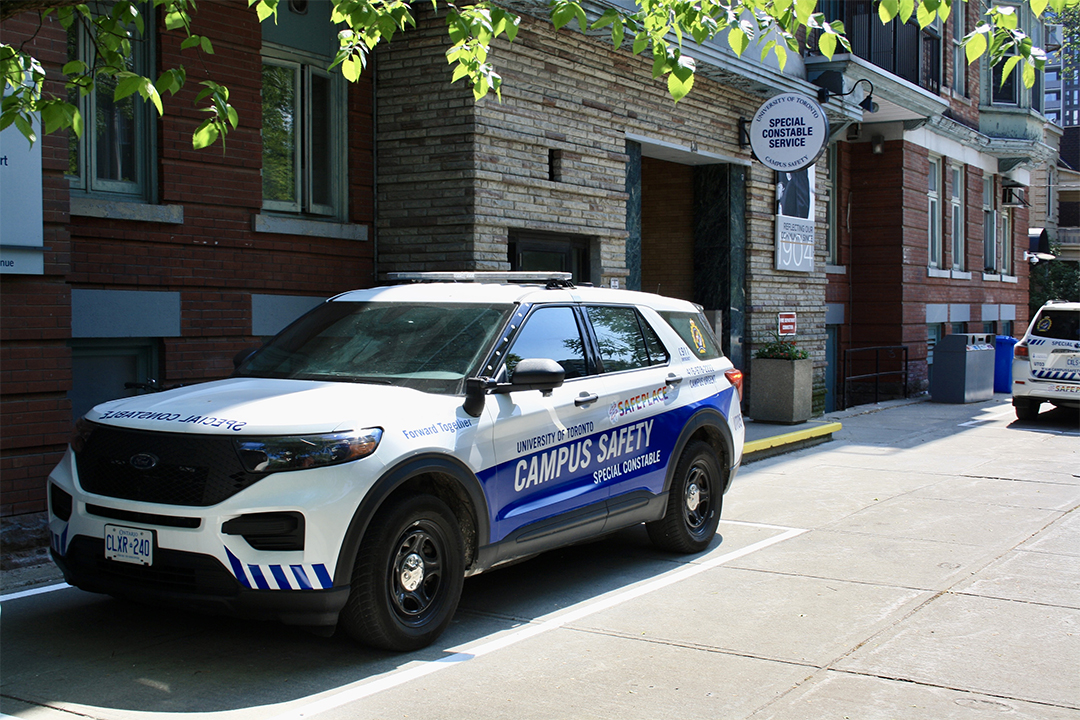In May, the three branches of Campus Safety — one for each campus — released their annual reports for 2022. The reports reveal changes in how Campus Safety branches have been responding to mental health crises. The reports also show an increase in theft across all campuses compared to last year, although the number of incidents remain below pre-pandemic levels.
Mental health
During the University Affairs Board (UAB) meeting on May 31, Sandy Welsh, vice-provost, students, gave an overview of the annual reports.
Welsh also highlighted a report on Campus Safety’s role in responding to students in mental health crises that she commissioned with Kelly Hannah-Moffat, vice president of people strategy, equity and culture. The report was published in October 2022 and highlighted some of the new changes Campus Safety is implementing across all three campuses.
Some of the report’s recommendations included improving mandatory training for Campus Safety staff; reexamining cooperation between Campus Safety, student wellness services, and student groups in responding to students in mental health crises; and strengthening communications between Campus Safety and the U of T community. Welsh explained that a new tri-campus safety leadership table will continue to tailor approaches that allow each campus to respond to its students’ needs.
Campus Safety has previously received backlash for its response to students experiencing mental health crises, the most infamous being an incident in 2019 where Campus Safety handcuffed a student.
Mental Health Acts (MHAs), characterized as responses to students experiencing a mental health crisis, have increased across all three campuses to a total of 76 cases. This remains lower than pre-pandemic numbers. UTSG came the closest to pre-pandemic numbers, with 49 MHAs occurring in 2022 compared to 55 MHAs in 2019.
In 2021, the University of Toronto Students’ Union (UTSU) published a report on Campus Safety. The report stated that campus safety involvement in mental health situations presents a barrier for students uncomfortable with police assistance. It argued that campus safety was not equipped to handle mental health crises and called on the university to expand training as well. The UTSU also wrote that campus police should decrease its involvement on campus and delegate some of its roles, such as responding to mental health crises and sexual assault cases, to other parts of the university.
In April 2022, the UTSC branch of Campus Safety hired Khadija Uddin as a community crisis response coordinator. According to the UTSC report, Uddin manages the branch’s response to mental health calls and has decreased “the need and number of uniformed Constables attending [mental health] calls.” The coordinator accompanies special constables on crisis calls and, if the constable determines it is safe, assesses the student’s needs and helps stabilize their situation. The other two branches are working to integrate a coordinator into their team and will receive biannual training from the coordinator, according to the UTM Campus Safety report.
In an email to The Varsity, Aidan Thompson, UTSU vice president, public & university affairs, wrote that the UTSU is currently working on a revised 2023 Campus Safety report that will provide more insight into the union’s current standing on Campus Safety’s policies and protocols.
Return to ‘normal’
According to the reports, crime occurrences increased across all three campuses in 2022. The reports attributed this to lessened COVID-19 restrictions, resulting in a return to normal campus activity.
With more on-campus activity comes an increase in safety calls and crimes. Across all three campuses, the total number of thefts under $5,000 has increased by almost 102 per cent, with a total of 109 more cases. From 2021 to 2022, UTSG had an increase from 97 to 171 cases, UTSC had a jump from nine to 25 cases, and UTM went from one case to 21. Between the three campuses, Campus Safety documented a total of 216 cases of theft in 2022.
The safety reports highlighted that these numbers remain lower than pre-pandemic levels. In 2019, Campus Safety reported a total of 391 cases, with 304 coming from UTSG. The UTSU’s 2021 report pointed out that, despite a reduction in crime over the past years, the number of officers and the budget for Campus Safety had increased.
Training
All three reports highlighted training as a key component to ensure Campus Safety meets “the needs of the University.” Police officers who receive mental health training have shown to be more adaptable to the needs of cases involving a mental health problem.
A similar number of special constables on each campus received Annual Use of Force training. This training was developed with recommendations from police personnel, community members, and other institutions. The training curriculum includes a balance of skills training, sensitivity to a University environment as well as practical field experience. While 59 people received Annual Use of Force training, only 11 received Mental Health First Aid across all three campuses.
At the UAB meeting, Part-Time Undergraduate Student Governor Susan Froom asked why the number of Campus Safety staff receiving training was low. Heather Boon, vice-provost, faculty & academic life, explained that special constables have varying levels of experience. The more experienced constables will have taken more of the courses provided by Campus Safety.
Boon explained that the number of staff that receive training can be influenced by how many people are hired within the year. While there are some courses that experienced constables can take, those courses also may have a cap based on attendance per campus. She added that it could take years to ensure all special constables received the training they need.



No comments to display.